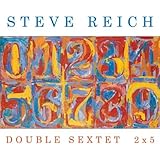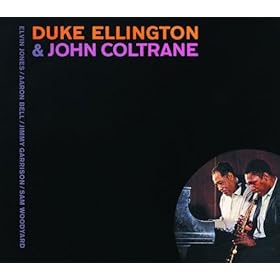We Love Advances
 Steve Reich’s latest Nonesuch CD recently arrived, sans artwork in a little cardboard case. The disc features Double Sextet and 2×5, his collaborations with Eighth Blackbird and Bang on a Can. The former piece won the 2009 Pulitzer Prize in Music. The latter is his most explicit use of rock instrumentation to date.
Steve Reich’s latest Nonesuch CD recently arrived, sans artwork in a little cardboard case. The disc features Double Sextet and 2×5, his collaborations with Eighth Blackbird and Bang on a Can. The former piece won the 2009 Pulitzer Prize in Music. The latter is his most explicit use of rock instrumentation to date.
According to the Nonesuch site, it’s still in the “pre-order” phase of activities, so we’ll be good and hold off on a proper review ’til it’s closer to the actual release date (9/14).
Suffice it to say, if you’re a regular visitor to Sequenza 21, you’re likely going to want one, possibly three, copies of this recording. An intergenerational summit – minimalist elder statesman meets post-minimal/totalist ace performers – that, in terms of importance, is more or less the Downtown version of Duke Ellington and John Coltrane.
Here’s some footage of Reich rehearsing BoaC:
Thanks Christian. I did not know his age. He doesn’t look very old. I bumped into him on a metro north train this year. I had the pleasure of explaining to a copassenger who he was and telling him I am a big fan of his work.
Nate,
The members of BoaC and 8bb are much younger than Steve Reich.
C
Robert Black (Bang on a Can Allstar) is not a young performer though he looks it. I can assume the same for the other key performers in the organization. I know Robert was on Phillip Glass’ first tour and recording. Bang on a Can came around afterward due to the Yale peoples’ efforts but members of that group are elder statesmen themselves.
“Christian, I didn’t mean more improvised or “more prog”, simply more charted than scored. I get the feeling the result would be completely Reich and quite possibly — strangely enough — even *more* Reich than what’s there now.”
…which is surprising considering how much of Reich’s earlier percussion music like Drumming relies essentially on controlled improvisation, at least as part of the larger texture.
I’m not a big fan of the Double Sextet myself. It just sounds warmed over, like Reich is just going through the motions. 2×5, at least the one clip I’ve heard above, sounds more promising, “toy quality” or not. Still, with Reich, who I consider America’s greatest living composer, I’ll pretty much give him a free pass to try whatever he wants out.
Christian, I didn’t mean more improvised or “more prog”, simply more charted than scored. I get the feeling the result would be completely Reich and quite possibly — strangely enough — even *more* Reich than what’s there now.
Of course Reich is brilliant and accomplished and my time would be best spent looking for what sounds good and is interesting about this music, but still, hearing drums played like that in public just breaks my heart. You gotta wonder if Reich has ever in his life seriously listened to a single good drummer. Regardless of his intentions he clearly hasn’t done his homework and this fact is clearly audible.
Exactly. Steve Layton is right, there is a bit of a “toy” feel to this sound, and it’s a sound that I would avoid in my music. But Reich invented this particular “toy” from various unrelated scraps he found as a young man – there’s no reason for him to avoid playing with it.
I think Lawrence is onto something there. Sure, we could envision an improvised piece based on 2×5 by say, Trey Gunn, Bill Bruford, Tony Levin, and Robert Fripp that would be much more prog than BoaC’s rendition. But that’s not what Reich intended.
I’d also point out that this is a rehearsal clip, not a live performance or the studio recording.
These comments all seem perfectly on the mark to me. But Reich isn’t obliged to sound like anything but Reich, and this is how he does it.
I do agree with Steve (Layton) and I guess to a certain extent with Hal Holbrooke. I don’t think Reich is at all comfortable with not notating a part!
I’ve got to say that coming up through a couple generations of prog musicians, the video performance has a little bit of a “toy” feel. The guitars wouldn’t really get that whole league of Crafty Guitarists out there too excited… And I do think that Joseph hits something with his comment about the drums: tied to the notation it just lacks the whole point of what trap sets are all about. I know there are any number of excellent prog drummers who — probably without any score reading ability at all — could produce something more living, vital and yet totally integrative and tight just by letting them work out the changes and then go to town. Same really for the bass… In fact, this is one of those instances where what’s really needed is a *chart* (in the jazz sense) more than a score.
Chris,
Well said.
Yes, there’s definitely a connection between 2×5 and Electric Counterpoint. But, to my ears, the opportunity to deal with the ‘whole band,’ as it were, adds a new layer to Reich’s incorporation of rock instruments. If you like Electric Counterpoint, 2×5 will likely be even more exciting. If you like whatever it is our alias poster Joe Holbrooke likes, then … well, I suppose you should look elsewhere for your next CD acquisition. 🙂
“well it inevitably sounds square, dry, even lifeless as compared to the more accomplished idiomatic music being made with those instruments.”
Well, hang on a second…I haven’t heard this piece in its entirety (2 x 5), but it sounds like a continuation of Reich’s piece for Pat Metheny (Electric Counterpoint). And my friends who have played that piece are seasoned jazz and rock players (in addition to having a high degree of classical technique). They did welcome the challenge of realizing that piece – one friend did it alone with prerecorded tracks and with Reich in the audience. In fact, Reich had some great direction for him regarding EQ that allowed for a more accurate and grooving performance.
I guess what I’m saying is that Reich’s writing for rock instrumentation is totally different approach than John Zorn’s (Moonchild is what I’m thinking of…) but it’s no less welcomed by guitarists, bassists, and drummers out there.
Meanwhile, the Canadian Broadcasting Corporation has some live recent Reich performances (http://www.cbc.ca/radio2/cod/ (type in “Reich” and the concerts will come up)). Still, any new Steve Reich recording is always welcome!
You can really hear the trouble with using rock instrumentation in this clip. We are so used to hearing these instruments being played by people who have devoted their lives to developing unique, personal, and advanced approaches to their instruments. When you strip all that away and ask generally trained players to play cute little eighth note licks over and over again, well it inevitably sounds square, dry, even lifeless as compared to the more accomplished idiomatic music being made with those instruments.
Interestingly, I’ve already heard at least 3-4
different recordings of DS and one of 2×5 that have been floating around. Both are good pieces.